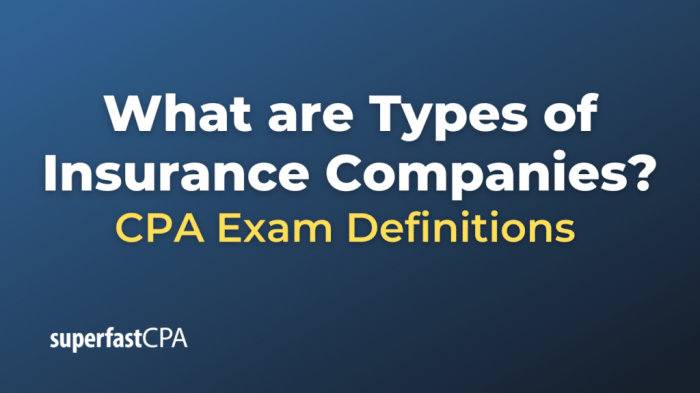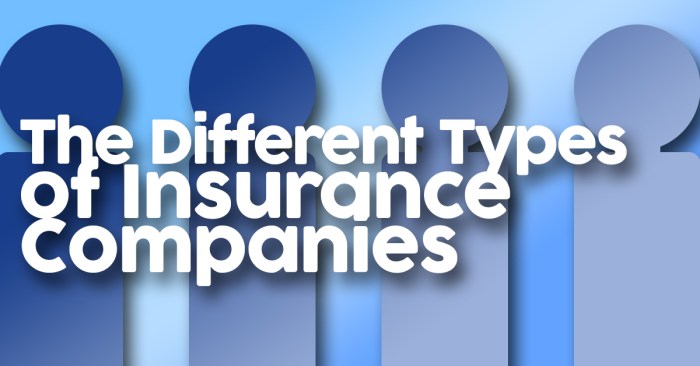
Can I use two different insurance companies? It’s a question that pops up when you’re thinking about coverage for your car, your house, your health, and even your life. You might be wondering if spreading your insurance across multiple companies could save you some cash or offer better protection. Think of it like assembling the ultimate insurance dream team, where each company brings their own unique skills to the table.
This is a common question, especially as people’s needs become more complex. Maybe you’ve got a classic car that needs specialized coverage, or a side hustle that requires additional insurance. Maybe you’re just looking for the best deal possible. Whatever the reason, it’s good to know your options and understand the pros and cons of using multiple insurance companies.
Understanding Insurance Coverage Types

Insurance is an essential part of life, providing financial protection against unexpected events. It’s like a safety net that helps you bounce back from unforeseen circumstances. But with so many different types of insurance, it can be overwhelming to figure out which ones you need. Let’s break down some common insurance types and their coverage options.
Auto Insurance
Auto insurance is mandatory in most states and covers damages to your vehicle and others in the event of an accident. There are several types of auto insurance coverage:
- Liability Coverage: This is the most basic type of auto insurance, covering damages to other people’s property and injuries caused by you in an accident. It typically includes bodily injury liability and property damage liability.
- Collision Coverage: This covers damages to your own vehicle in a collision, regardless of who is at fault. It’s usually optional, but if you have a loan on your car, the lender may require it.
- Comprehensive Coverage: This protects your vehicle from damages caused by non-collision events, such as theft, vandalism, hail, or fire. Like collision coverage, it’s optional, but it’s usually a good idea to have it if you have a newer car.
- Uninsured/Underinsured Motorist Coverage: This protects you if you’re involved in an accident with a driver who doesn’t have insurance or doesn’t have enough insurance to cover your damages.
- Medical Payments Coverage: This covers medical expenses for you and your passengers in an accident, regardless of who is at fault. It’s usually a good idea to have this coverage, even if you have health insurance, as it can help supplement your health insurance benefits.
Home Insurance
Home insurance protects your home and its contents from damage or loss due to various events, such as fire, theft, or natural disasters. It typically covers the following:
- Dwelling Coverage: This covers the structure of your home, including the foundation, walls, roof, and plumbing.
- Personal Property Coverage: This covers your belongings inside your home, such as furniture, appliances, clothing, and electronics.
- Liability Coverage: This protects you if someone is injured on your property or if you cause damage to someone else’s property.
- Additional Living Expenses Coverage: This covers the costs of living elsewhere if your home becomes uninhabitable due to a covered event, such as a fire or a natural disaster.
Health Insurance
Health insurance covers medical expenses, such as doctor visits, hospital stays, and prescription drugs. It can be purchased through your employer, through the Affordable Care Act Marketplace, or directly from an insurance company.
- HMO (Health Maintenance Organization): HMO plans typically require you to choose a primary care physician (PCP) who will coordinate your care. You usually need to get referrals from your PCP to see specialists. HMOs generally have lower premiums but may have higher out-of-pocket costs.
- PPO (Preferred Provider Organization): PPO plans offer more flexibility than HMOs, allowing you to see any doctor or specialist without a referral. You’ll usually pay a lower co-pay or coinsurance for services from doctors within the PPO network.
- POS (Point of Service): POS plans are a hybrid of HMOs and PPOs. You choose a PCP but can see specialists outside the network for a higher cost.
- HDHP (High Deductible Health Plan): HDHPs have lower premiums than other plans but have a higher deductible. This means you’ll pay more out-of-pocket for medical expenses until you reach your deductible.
Life Insurance
Life insurance provides financial protection for your loved ones in the event of your death. It pays a death benefit to your beneficiaries, which they can use to cover expenses such as funeral costs, mortgage payments, or living expenses.
- Term Life Insurance: This provides coverage for a specific period of time, usually 10, 20, or 30 years. It’s typically the most affordable type of life insurance. If you die within the term, your beneficiaries will receive the death benefit. If you die after the term, your beneficiaries will receive nothing.
- Whole Life Insurance: This provides permanent coverage, meaning it stays in effect for your entire life. It’s more expensive than term life insurance, but it also builds cash value that you can borrow against or withdraw from.
- Universal Life Insurance: This is a type of permanent life insurance that offers more flexibility than whole life insurance. You can adjust your premiums and death benefit over time, and you can choose how your cash value is invested.
Benefits of Using Multiple Insurance Companies

Think of your insurance like your wardrobe – sometimes, you need a specific outfit for a particular occasion. The same goes for insurance. You might need a specialized policy for a hobby, a different one for your home, and another for your car. This is where the magic of using multiple insurance companies comes in!
Potential Cost Savings
Choosing different insurance companies for various needs can lead to significant cost savings. Here’s how:
* Specialized Coverage: Different insurance companies specialize in specific areas. A niche insurer might offer more competitive rates for your motorcycle, boat, or even your prized collection of vintage comic books.
* Competitive Bidding: By shopping around, you can compare quotes from multiple insurers and choose the best deals for each type of coverage. This allows you to potentially negotiate lower premiums or find policies with better coverage options.
* Bundling Options: While some companies offer discounts for bundling multiple policies, others might not. By using different companies, you can maximize your savings by choosing the best deals for each individual policy.
Benefits of Specialized Coverage, Can i use two different insurance companies
When it comes to unique needs, specialized insurance can be a game-changer.
* Hobbies and Activities: If you’re a thrill-seeker with a passion for skydiving, scuba diving, or even rock climbing, you’ll need specialized coverage. A niche insurer will understand the risks involved and offer policies tailored to your specific activity.
* Valuables and Collections: Got a prized art collection, vintage guitars, or a collection of rare stamps? Specialized insurance provides coverage for these high-value items, ensuring you’re protected in case of damage or loss.
* Unique Risks: From professional liability insurance for freelancers to cyber security coverage for businesses, specialized insurance can protect you from specific risks that traditional policies might not cover.
Case Studies and Examples: Can I Use Two Different Insurance Companies

Let’s get real, folks. We’re not just talking about insurance theory here. We’re talking about real people, real situations, and real-world benefits of using multiple insurance companies. So, let’s dive into some case studies that show how this strategy can work in practice.
Examples of Successful Multi-Insurance Strategies
Using multiple insurance companies can be a smart move for individuals and families, especially those with diverse needs. Here are some real-world examples of how people have used multiple insurers to their advantage:
- The Young Couple with a Growing Family: Sarah and John, a young couple with a newborn baby, decided to split their insurance needs between two companies. They opted for a reputable national carrier for their home and auto insurance, known for its solid reputation and excellent customer service. For their health insurance, they chose a plan through John’s employer, which offered comprehensive coverage at a lower cost. This strategy allowed them to get the best of both worlds: reliable protection for their home and car, and affordable healthcare for their growing family.
- The Entrepreneur with Multiple Businesses: Mark, a successful entrepreneur with a thriving business portfolio, opted for a customized approach. He chose different insurers for each of his businesses, tailoring the coverage to the specific risks of each venture. This strategy ensured he had the most appropriate and cost-effective protection for each business, while also benefiting from specialized expertise and personalized service.
- The Family with a High-Risk Hobby: The Smith family, avid skiers, wanted to ensure they had adequate coverage for their winter adventures. They found a specialist insurer specializing in winter sports that offered comprehensive coverage for their ski equipment and medical expenses in case of accidents. They combined this specialized coverage with a standard home and auto insurance policy from another company, ensuring their overall needs were met.
Scenarios Where Multiple Insurers Shine
Let’s break down some scenarios where using multiple insurance companies can really pay off:
- Specialized Coverage: If you have unique needs, like owning a classic car or participating in high-risk hobbies, you might find that a specialized insurer offers better coverage and rates than a general insurance provider. For example, a classic car enthusiast might find a company that specializes in insuring vintage vehicles, offering tailored coverage for restoration costs and potential damage.
- Bundling Discounts: While some insurance companies offer discounts for bundling multiple policies, you might find that you can get even better discounts by using different companies for specific coverage. For example, you might get a better deal on your auto insurance by bundling it with your homeowner’s insurance, but you might find a better deal on your health insurance by going through your employer or a separate carrier.
- Cost Comparison: Comparing quotes from multiple insurers can help you find the most affordable options for your specific needs. You might find that one company offers the best rates for your home insurance, while another company offers the best rates for your auto insurance. This approach can help you save money in the long run.
Challenges and Solutions
While using multiple insurance companies can be beneficial, it’s not without its challenges. Here are some potential hurdles and how to overcome them:
- Managing Multiple Policies: Keeping track of multiple policies from different companies can be a headache. To manage this, consider using a digital insurance platform or a dedicated folder to organize all your policy documents and contact information.
- Claim Filing: Filing claims with multiple companies can be more complicated. To streamline the process, keep your insurance companies informed about your other policies and make sure you understand the specific procedures for filing claims with each company.
- Coordination of Benefits: If you have multiple health insurance policies, you’ll need to understand how they coordinate benefits. This can be complex, so it’s essential to consult with an insurance professional to ensure your coverage is coordinated properly.
Epilogue
So, can you use two different insurance companies? The answer is, it depends. It’s all about finding the right balance between cost savings, coverage, and convenience. By weighing the benefits and drawbacks, you can make an informed decision that fits your specific needs. Remember, it’s your insurance, so make sure you’re in control of it. You can always reach out to an insurance agent for personalized advice and guidance. Now go out there and get the insurance that’s right for you!
Frequently Asked Questions
What if I have a claim with multiple insurance companies?
If you have a claim, you’ll need to contact each insurance company involved. They’ll handle the claim separately, but it’s a good idea to keep them informed about each other’s involvement.
Can I save money by using multiple insurance companies?
You might save money by finding specialized insurance companies that offer lower rates for specific needs. However, you’ll need to consider the administrative costs and potential complexities of managing multiple policies.
Is it complicated to manage multiple insurance policies?
It can be a bit more work, but it’s not impossible. You can use a system to track renewal dates, premiums, and policy details. You can also use online platforms to manage your policies and communicate with your insurance companies.




